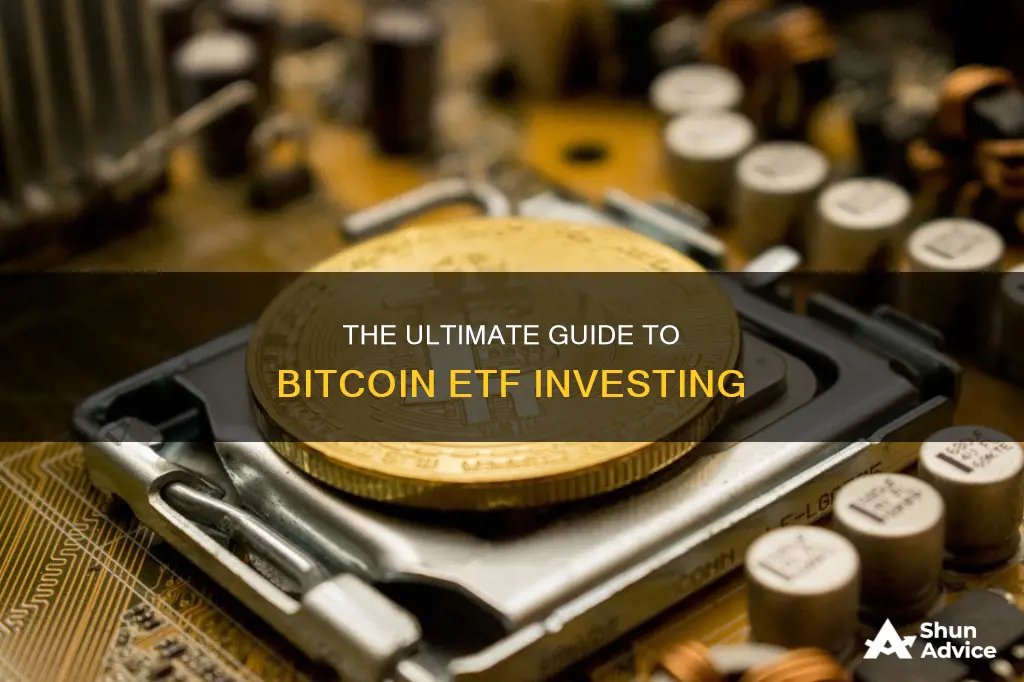
Bitcoin ETFs (exchange-traded funds) are baskets of assets that trade on a stock exchange. They are similar to mutual funds but are traded directly on a stock exchange. In January 2024, the US Securities and Exchange Commission (SEC) approved the first spot Bitcoin ETFs, which hold Bitcoin directly, as well as several Bitcoin futures ETFs, which use futures contracts to gain exposure to Bitcoin's price movements.
Investing in a Bitcoin ETF can be a good option for those who want a more traditional way of investing in the digital currency, as it removes the complexities of investing directly in Bitcoin, such as storage and choosing an exchange. However, it's important to understand the risks associated with investing in Bitcoin and conduct thorough research before making any investment decisions.
| Characteristics | Values |
|---|---|
| How to buy | Through brokerages, e.g. Robinhood, Charles Schwab, Morgan Stanley's E-Trade, Fidelity Investments |
| Who should invest | People looking for a more traditional way of investing in digital currency |
| Where to purchase | Most online brokers who offer traditional securities like stocks and bonds |
| Are they regulated? | Yes, by the Securities and Exchange Commission |
| Examples | ARK 21Shares Bitcoin ETF, Fidelity Wise Origin Bitcoin Trust, Wisdom Tree Bitcoin Fund, Invesco Galaxy Bitcoin ETF, Valkyrie Bitcoin Fund, iShares Bitcoin Trust, VanEck Bitcoin Trust, Franklin Bitcoin ETF, Grayscale Bitcoin Trust |
What You'll Learn

What is a Bitcoin ETF?
A Bitcoin ETF, or exchange-traded fund, is an investment vehicle that is publicly traded, like a stock, but tracks the performance of Bitcoin rather than a company. ETFs are traded on traditional stock exchanges, and their value should rise when the asset increases in price and fall when it decreases.
A Bitcoin ETF works in much the same way as any other ETF. Investors buy shares in the ETF through their brokerage accounts and can trade them the same way they'd trade shares in any other company. Bitcoin ETFs track the current price of Bitcoin and should act in lockstep with its price swings.
A spot Bitcoin ETF, in particular, creates a simple, legally compliant way to trade the price of Bitcoin, accessible on markets that investors are already familiar with. It enables investors to gain exposure to Bitcoin without the hassle and security concerns of owning it themselves.
A Bitcoin futures ETF, on the other hand, uses futures contracts to achieve its goal of offering exposure to the price movements of Bitcoin. Fund managers purchase these contracts and bundle them into a fund.
The first official Bitcoin-linked ETF was the ProShares Bitcoin Strategy ETF (BITO), which mainly uses futures contracts. It was approved by the SEC in October 2021 and is listed on the New York Stock Exchange. In January 2024, the SEC approved the first 11 Bitcoin spot ETFs, which hold Bitcoin as opposed to futures.
Bitcoin Gift Cards: Easy Investing for Beginners
You may want to see also

How to buy a Bitcoin ETF
A Bitcoin ETF, or exchange-traded fund, is a basket of assets that trades on a stock exchange. A spot Bitcoin ETF pools investor money to purchase Bitcoin directly. It is managed by an investment firm and listed on a traditional stock exchange.
How to Buy
The majority of people will be able to buy a Bitcoin ETF through their broker or advisor. You can also use a brokerage app such as Robinhood or Charles Schwab. If you don't already have an account, you can submit basic forms to open one at companies such as Morgan Stanley's E-Trade or Fidelity Investments.
Fees
The upfront cost to buy and sell ETFs is generally zero. However, large management fees can be a problem for Bitcoin ETFs, so it's important to research the fees of different providers.
Risks
Bitcoin is a high-risk and volatile investment with a short trading history and no underlying cash flows to support its value. It is also susceptible to cybersecurity risks, fraud, and security breaches.
Alternatives
If you don't want to invest in a Bitcoin ETF, you can invest directly in other digital assets such as Ether or Tether through cryptocurrency exchanges like Binance, Coinbase, and KuCoin.
The Ultimate Guide to Investing in Bitcoin Code
You may want to see also

Pros and cons of Bitcoin ETFs
Pros of Bitcoin ETFs:
- Simplified Investment and Accessibility: Bitcoin ETFs provide a more accessible way to invest in Bitcoin, as investors can gain exposure to its price movements without purchasing the cryptocurrency directly. This avoids the complexities of crypto wallets and exchanges, making it ideal for traditional investors and those new to cryptocurrencies.
- Regulatory and Security Benefits: Bitcoin ETFs, especially those approved by regulatory bodies like the U.S. Securities and Exchange Commission (SEC), offer a higher standard of reliability and security compared to direct cryptocurrency investments. They mitigate regulatory risks, address concerns about wallet security, and reduce the likelihood of cyber-attacks.
- Market Integration and Liquidity: Bitcoin ETFs are traded on traditional stock exchanges, providing liquidity and a familiar trading environment for regular investors. They also present opportunities for institutional investors, further integrating Bitcoin into mainstream financial markets, potentially leading to more stable prices over time.
- Diversification and Tax Benefits: Bitcoin ETFs allow investors to diversify their portfolios. Some include Bitcoin futures, stocks, and other cryptocurrencies, offering balanced investment options. Additionally, certain Bitcoin ETFs regulated by the SEC may offer tax efficiency, providing financial incentives.
Cons of Bitcoin ETFs:
- Control and Ownership: One of the main drawbacks of Bitcoin ETFs is that investors do not own actual Bitcoin. This contradicts the decentralisation principle of cryptocurrencies, and investors miss out on the benefits of direct ownership, such as transacting with Bitcoin or holding it as an asset without intermediaries.
- Cost Implications: Bitcoin ETFs often come with management fees and operational costs, which can reduce net returns for long-term investments. These fees tend to be higher than those of conventional ETFs due to the costs of maintaining and safeguarding the underlying cryptocurrency holdings.
- Market Hours Limitation: Unlike the 24/7 cryptocurrency market, Bitcoin ETFs are limited to the stock market's operational hours. This restriction can result in missed opportunities due to Bitcoin's constant price fluctuations.
- Tracking Errors: While Bitcoin ETFs aim to replicate Bitcoin's price movements, discrepancies known as tracking errors can occur, leading to potential misalignments with the actual market performance of Bitcoin.
- Limited Trading Options: Bitcoin ETFs only track the price of Bitcoin and cannot be traded for other cryptocurrencies, limiting investors' ability to adapt to market trends quickly.
Strategic Bitcoin Investments: Growing Your Money
You may want to see also

How do Bitcoin ETFs work?
A bitcoin exchange-traded fund (ETF) is a financial product that allows investors to gain exposure to the price movements of bitcoin without actually holding the asset itself. Shares of a bitcoin ETF are traded on traditional stock exchanges, making it easier for investors to participate in the cryptocurrency market.
There are two main types of bitcoin ETFs: spot and futures. A spot bitcoin ETF typically holds actual bitcoin as its underlying asset and attempts to track the real-time price of bitcoin as closely as possible. These ETFs are considered more transparent and intuitive for investors since each share corresponds to a specific number of bitcoins held.
On the other hand, futures bitcoin ETFs do not hold actual bitcoin. Instead, they use bitcoin futures contracts to gain exposure to the cryptocurrency. These contracts allow investors to speculate on the future price of bitcoin, and they can be rolled over as the expiration date approaches. While futures-based ETFs can provide leveraged or inverse exposure to bitcoin's price, they may not track spot prices exactly, and there can be costs associated with rolling over the contracts.
Bitcoin ETFs provide a more accessible and regulated way to invest in bitcoin, attracting both retail and institutional investors. They are subject to rules that ensure transparency and protect investors, addressing concerns about fraud and market manipulation. However, it is important to note that investing in bitcoin, whether directly or through an ETF, carries inherent risks due to the volatility of the cryptocurrency market.
Dragons' Den Bitcoin Loophole: Did They Invest?
You may want to see also

Should you invest in Bitcoin ETFs?
Bitcoin ETFs (exchange-traded funds) are a relatively new way to gain exposure to the cryptocurrency's price movements without needing to own any. These funds pool investor money to purchase Bitcoin directly and are managed by investment firms listed on traditional stock exchanges.
The case for investing in Bitcoin ETFs:
- Simplicity, security and liquidity: Bitcoin ETFs offer an easy, familiar way to gain exposure to Bitcoin, particularly for those who are already invested in traditional stock markets.
- Lower fees: The competition between issuers has meant that fees are competitive.
- No need to own or store Bitcoin: This removes the security concerns and hassle of buying and storing cryptocurrency.
- Accessibility: ETFs allow investors to gain exposure to Bitcoin within their budget and risk tolerance.
The case against investing in Bitcoin ETFs:
- Volatility: Bitcoin is a highly volatile asset, and its price has fluctuated wildly over the past few years.
- Regulatory uncertainty: The regulatory landscape for cryptocurrencies is still evolving, which could impact the legality, trading and valuation of Bitcoin futures.
- Tracking error: The value of the ETF may not always directly match the exact current value of Bitcoin.
- Security: Cryptocurrency exchanges are susceptible to hacks, fraud and security breaches.
In conclusion, whether or not to invest in Bitcoin ETFs depends on your risk tolerance and investment goals. Bitcoin ETFs can be a good option for those looking for a more traditional, familiar way to gain exposure to Bitcoin. However, it is important to remember that Bitcoin is a highly volatile and speculative asset, and there are regulatory and security risks to consider.
Tom Brady's Bitcoin Investment: Did He Make the Right Move?
You may want to see also
Frequently asked questions
A Bitcoin ETF (exchange-traded fund) is a basket of assets that trades on a stock exchange. A spot Bitcoin ETF pools investor money to purchase Bitcoin directly, and it is managed by an investment firm. ETFs are traded on stock exchanges, providing investors with diversified exposure to various asset classes and the flexibility to buy or sell shares throughout the trading day.
You can buy a Bitcoin ETF through most online brokers who offer traditional securities like stocks and bonds. You can use popular trading apps like Robinhood or Charles Schwab, or open an account with companies like Morgan Stanley's E-Trade or Fidelity Investments.
Bitcoin is a high-risk and volatile investment with a short trading history and no underlying cash flows to support its value. There is also the risk of tracking error, where the value of the ETF may not directly match the current value of Bitcoin due to management fees, transaction costs, or logistical issues. Regulatory uncertainty and market liquidity are also concerns.







